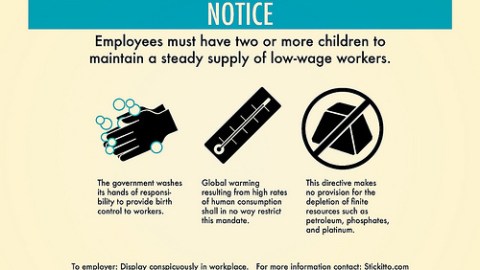Employers, Your Business Isn’t a “My Morality Theme Park,” or, What’s Wrong with Arizona’s Proposed Birth Control Legislation

Legislation has been proposed in Arizona that would allow employers to force women to provide documentation of their “medical” reasons for needing birth control before their health insurance would have to cover it.
This Arizona legislation is precisely an example of something I described in an earlier column: We talk so pervasively, even euphemistically, about how birth control is important for “women’s health” and cysts–which it is, don’t get me wrong—that we end up with a legislator saying, “okay, if it’s all about women’s health, then how about if you present medical records to prove your health problem, and we’re only going to cover those women”–the ones with non-lustful motivations.
They’re the women that we’ve spotlighted, too—rather than those who want to enjoy non-procreative sex for purposes of pleasure, intimacy, and bonding—so no wonder the legislator uses this tactic. We handed it to him on a silver platter. (Incidentally, this legislation presumably would also allow employers to drop from coverage a huge swath of prescription birth control that has no “women’s health” pretext whatsoever, including IUDs, diaphragms and injection methods.)
I’m going to try to take his argument earnestly. My first question: Where do we draw the line?
The obvious example is Viagra. Why should I indirectly cover it, as an employer, if I’m not covering the means for women to enjoy non-procreative sex? To cover Viagra, I’d require medical affidavits that the couple really was trying to conceive a child, and needed to solve the ED problem for that reason. No fibbing.
I wouldn’t provide Viagra to unmarried men, at all. If they’re single and want Viagra, then they want to have recreational sex or to conceive an out of wedlock baby.
Likewise with vasectomies, whose sole purpose is to allow men to have non-procreative sex.
There are subtler examples. Let’s say that I’m an employer who as a matter of conscience believes in Zero Population growth. Supporters of zero population zealously advocate for replacement fertility only in each nation, in the name of sustainability. Advocates find it immoral that as a species we reproduce beyond our capacities and resources.
If I were that employer, why should I support an employee who refuses to use birth control, and who has 10 children? To the zero population zealot employer, it’s morally abhorrent. He doesn’t understand why he should have to to “aid and abet” by allowing his insurance to cover her hospital delivery costs. Under the aegis of her religious belief, she’s producing too many children, is his conviction, and it makes him sick, to think that he’s being forced to pay for it.
Why shouldn’t I have the freedom of conscience not to pay, the same freedom that this legislation proposes for employers who disapprove of women having sex?
I’m a Christian Scientist. I don’t believe in medicine as my first option for healing, so I shouldn’t have to cover medical remedies before my employee has exhausted holistic methods.
I’m a devout Muslim employer who avoids alcohol as a matter of faith. Why should I pay for rehab, alcohol-related illness, or Antabuse?
Why should I support fertility treatments? If it’s God’s will that you can’t conceive, that’s what it is. And so on.
This legislation talks as if an Employer’s business is like some private little kingdom, or “My Morality Theme Park”—some realm where they can do whatever the hell they want to their employees or their compensation packages, which is really what health insurance is. (By the way, none of this nonsense about employers is happening if only we’d gone for a Single Payer System, which would have removed employers from the equation).
Private accommodations such as stores and businesses aren’t exempt from constitutional principles and civil rights legislation. That was a major innovation of the 1964 Civil Rights Act. Employers can’t act in a discriminatory fashion– lunch counters weren’t allowed to remain segregated just because a business owner wanted it that way. Segregation was his impassioned conviction–but businesses aren’t given a free ride to act discriminatorily or to violate Constitutional principle because they’re business owners.
That’s a 19th century view—a purist laissez faire view of markets– and not a 20th century view.
Speaking of the 20th century, those of who believe in it need to start defending the principles that it stood for.
It’s not as if social conservatives have all the sexual “values” and we’re the negative space of No Values. I’m tired of people acting that way, fearful of the Values Bogeyman of the Right, always rushing in to reassure, “Oh, no! We don’t want people to have sex, it’s just that, well, we need birth control for a cyst.”
Other people disagree with our values. I understand that. And how. But they are values, and we’d better start describing and fighting for them. Personally, this is how I define them:
As for “sluts?” I don’t treat them like the crazy relative at Thanksgiving dinner, or shove them in the closet. It’s tempting to paraphrase that axiom, “I didn’t stick up for the sluts, I didn’t stick up for the promiscuous… And, then, when they came for me, there was no one left to defend me.”





